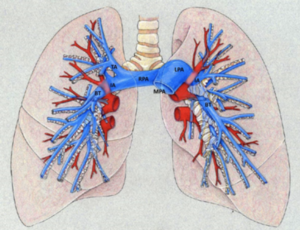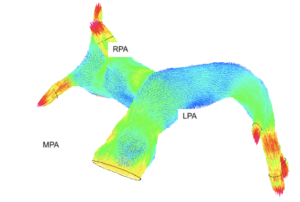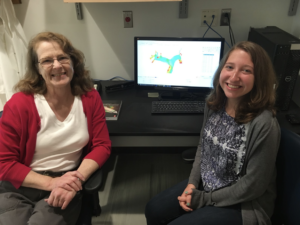Each summer TCNJ students have the opportunity to participate in the Mentored Undergraduate Summer Experience (MUSE). Students are awarded a research stipend and on-campus housing to conduct research with faculty members for eight weeks. This summer, the School of Engineering and its faculty have hosted over ten MUSE projects, including the analysis of the pulmonary artery catheter (PAC) with Dr. Constance Hall, Professor of Biomedical Engineering, and her MUSE student, Kristen Zozulia ‘21.
Catheter and sensor systems are routinely used in intensive care units to monitor patient heart function. The PAC detects pressures and oxygen levels and continuously measures cardiac output. The use of a heating filament allows for the calculation of cardiac output by looking at the temperature difference between the heating filament and the downstream temperature sensor. The clinicians testing the catheter are concerned that the blood is exposed to temperatures that can damage certain blood components required for normal function.

Figure 1. Anatomy of pulmonary blood vessels. The main pulmonary artery is labeled MPA and exits the right side of the heart and branches to the left pulmonary artery (LPA) and the right pulmonary artery (RPA).
The summer project focuses on the effort of quantifying their concerns by using computer models to predict temperature and the pressure and velocity of blood flow. To get an accurate flow and temperature profile, an anatomically realistic 3D model of the pulmonary artery is developed from cardiac images of both male and female subjects. The goal is that the results can better inform clinicians and device designers about the catheter’s function and unintended effects. The project seeks to advance and broaden modeling techniques to help solve clinical problems.

Figure 2. Velocity profile of the 3D modeled pulmonary artery
On her experience with the program, Kristen said, “MUSE has been an invaluable experience. The close relationship I developed with my mentor, Dr. Hall, and the knowledge she continually imparted has been extremely valuable. She was not only invested in my academic growth, but in my professional development as well. This experience greatly expanded my technical skills as I learned four new software programs in a summer’s time. Above all, I was afforded the chance to leverage my academic background to solve real world problems.” Kristen was also selected to present her summer research at the Biomedical Engineering Society (BMES) Fall Conference, an incredible opportunity she credits to her mentor, MUSE, and the School of Engineering.

